
In this series, we invite you to join writers and artists in a practice of artistic Scriptural reflection.
Interpreting Scripture through art brings new insight to the fore through comparisons between textual details and elements of the artistic medium, as shaped by the artist. The art invites the viewer to draw out further insights based on the layers of comparison that their unique perspective brings, making artistic interpretation of Scripture a communal practice.
We suggest that with each devotional guide you first read the Scripture and take in the piece of art, then read the reflection, observe the piece again, and engage with the prompts for creative response. We also invite you to share your creative and reflective responses on social media and tag us. You can find us on Facebook (@tothewell), Instagram (@wap_ivcf), and Twitter (@IVWell).
Ezekiel 34
Therefore, you shepherds, hear the word of the Lord: As I live, says the Lord God, because my sheep have become a prey, and my sheep have become food for all the wild animals, since there was no shepherd; and because my shepherds have not searched for my sheep, but the shepherds have fed themselves, and have not fed my sheep; therefore, you shepherds, hear the word of the Lord: Thus says the Lord God, I am against the shepherds; and I will demand my sheep at their hand, and put a stop to their feeding the sheep; no longer shall the shepherds feed themselves. I will rescue my sheep from their mouths, so that they may not be food for them...
As for you, my flock, thus says the Lord God: I shall judge between sheep and sheep, between rams and goats: Is it not enough for you to feed on the good pasture, but you must tread down with your feet the rest of your pasture? When you drink of clear water, must you foul the rest with your feet? And must my sheep eat what you have trodden with your feet, and drink what you have fouled with your feet?
Therefore, thus says the Lord God to them: I myself will judge between the fat sheep and the lean sheep. Because you pushed with flank and shoulder, and butted at all the weak animals with your horns until you scattered them far and wide, I will save my flock, and they shall no longer be ravaged; and I will judge between sheep and sheep.
Tirzah created a series of oil paintings to accompany an exegesis paper that she wrote for a class at Duke Divinity School in Spring 2020. This devotional guide is adapted from that exegesis to guide you through a meditation on Ezekiel 34 and consideration of Tirzah’s paintings.
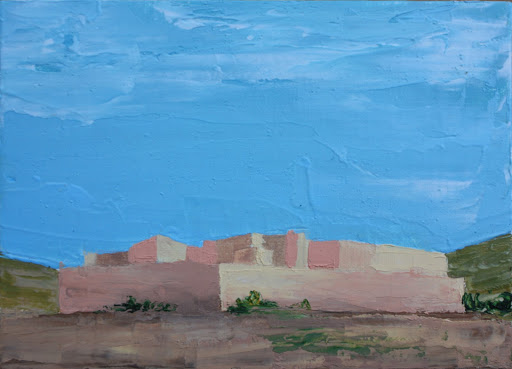
Jerusalem 1
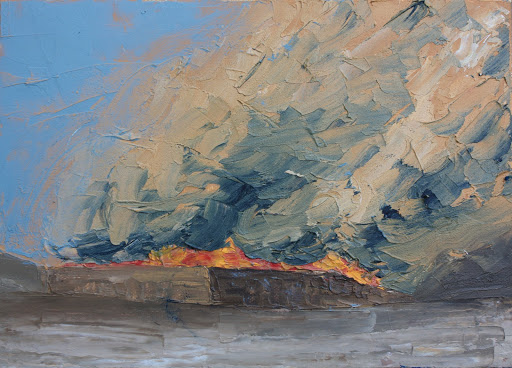
Jerusalem 2
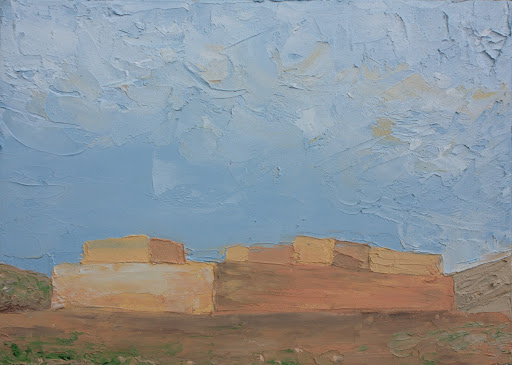
Jerusalem 3
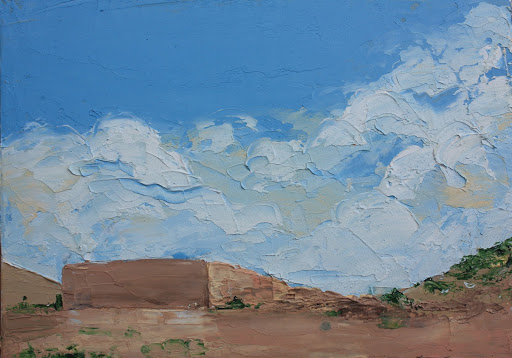
Jerusalem 4
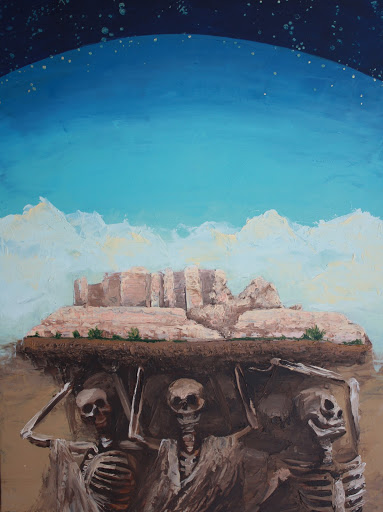
Untitled painting
Ezekiel 34 is a clear example of a prophecy of judgement that names and sees the plight of the poor by attributing blame and responsibility to poor shepherding. Its written words give value to the lived experience and the pain of the poor while acknowledging the culpability and complicity of those in power. It is proof that they have been seen and heard. Even in circumstances where it seems that the culpable parties may not be brought to justice, recognition matters. Voices and stories matter, and it is through art and literature that stories are given a platform to be heard and recognized while making meaning from pain.
These paintings I created for this reflection are meant to engage with the viewer on multiple levels. Which elements of the paintings stand out to you? What questions do they raise in your mind? How might your observations and questions be born out of your unique life experience? Would someone else you know notice different details or ask different questions? In many ancient canons, the size of the figure was relative to its importance in an artistic piece. In this piece, the remains of the living are larger than life. Were they not supporting the ruins of the city, they would be able to step up and touch the heavens. They are the most important element of the painting and yet they are pushed to the bottom, in the shadows and cropped. Even what the viewer does not know, namely that there is an underpainting covered by the visible paint, contributes to the story behind the painting. And to be sure, there are always stories that do not get heard.
The four studies of the city of Jerusalem represent the city at four different points in history. They push the viewer to consider the question: when we talk about certain time periods being “good,” are we speaking from the lens of the privileged or the oppressed? The invader or the invaded? The represented or the underrepresented?
Ezekiel 34 is the second of the “salvation oracles” following the oracles of destruction. Jerusalem has recently fallen. It is of the utmost importance that the first oracle given to Ezekiel after the initial fall of Jerusalem inform the leaders and upper-class among the Israelites that God will hold them accountable for their injustices. The prophecies of salvation begin with recognizing the plight of the most vulnerable. This chapter is also a prophecy against the very Israelites who did not care for their own. Ezekiel is commanded to “prophesy against the shepherds of Israel” (Ezek 34:2). The kings and rulers, or the “shepherds,” are accused of only taking care of themselves. They have not “strengthened the weak or healed the sick or bound up the injured…[they] have ruled them harshly and brutally” (Ezek 34:4). God is “against the shepherds and will hold them accountable (34:10). God not only places the culpability of poverty and sickness on the rulers but also names the importance of the physical and material well-being for all.
God states the need to rescue the flock from the shepherds, implying that they have been actively harming them. This harsh indictment continues to certain members of the “flock” as God addresses the ruling class in verse 17 (Ezek 34:17). There is a clear distinction made between the fat and the lean (Ezek 34:18-21). These fat sheep have consumed excessive resources and exerted power over the vulnerable. It was recorded that the conquering Babylonians gave land and vineyards to “some of the poor people, who owned nothing” (Jer 39:10). The plight of the oppressed was better under the conquerors than their own rulers! So, God promises to hold the shepherds accountable and to “judge between the fat sheep and the lean sheep” (Ezek 34:10, 20). Before continuing with the oracles of salvation for Israel as a whole, it was deemed necessary to set the standard first. There would be accountability.
If prophecy was used to elicit a more just lifestyle from those who heard and read it, it was also used to illustrate why there was a need to do so in the first place. The process of documenting, exploring, and displaying is a way for the author, scribe, and artist to search for meaning in what has been done while at the same time bringing it back into view of the public. Those who consume this literature and art are once again bearing witness to history. They are made to wrestle with the difficult verses and engage with art and literature, exploring it for meaning. How poorly were the “sheep” treated to elicit such judgement from God? Was life better for them under foreign rule? All the while, this searching, witnessing, and asking serves to see and recognize the plight of the poorest and hopefully make the viewer ask the same questions for their own context.
Response: Documenting a New Perspective (25-30 minutes)
- Pray. As Tirzah wrote, there are always voices that go unheard and stories that go untold. Ask God to bring to your mind an underrepresented perspective on current events in your life or in the world. Imagine yourself walking up to your front door from the inside. Before you open the door onto the world, ask God to show you what God sees. When you open the door, what do you see going on around you?
- Reflect. Journal for five minutes about what you saw during your prayer time. Whose perspective was highlighted? What is happening in the world or in your life that you haven’t given much thought to? What might you do to learn more about this perspective on events?
- Create. Using an artistic medium of your choice, choose an object, idea or pattern and represent it from a non-conventional perspective. For example, I might dance in my room and suspend a video camera from a slowly rotating ceiling fan to record it or write a poem arranging the words from right-to-left instead of left-to-right.
- Reflect. Observe the piece you’ve created and consider: what do you see (or hear, feel, smell, or taste) that you wouldn’t notice from a conventional perspective? How does this change the way you think about the subject of your piece?
- Synthesis. Take one more moment to synthesize your response. What is one thing you’ve learned about God, yourself, or the world? What is one new question you have? Pray this idea or question to God.
Photo by Steve Johnson from StockSnap.